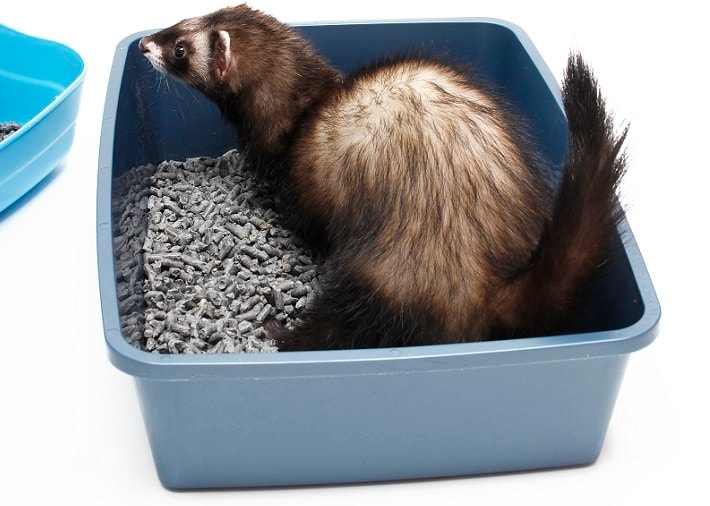All that was lacking was a pouting lower lip. If her canines hadn’t gotten in the way, she’d likely have managed that, too.
Haleakala had been admonished by Steve. She glared, mumbled in what he called her “swearing,” and pointedly turned her head away. When that didn’t suffice to sway him, she turned tail, lifted same and deposited her critique of his behavior right upon his sock-covered foot. Sometimes it is rather easy to guess what a ferret is thinking and feeling.
Technically, we aren’t supposed to project human emotions onto other species. This is called anthropomorphizing. But those who live with ferrets in their families for many years find them displaying ranges of emotion that closely resemble a human’s. A consistent failure within the social structure to have these emotions honored may cause bad behaviors to develop.
Emotional Upset
What are the signs of these problems? Often, they are the same signs humans display. The difference is that a ferret usually can’t find a way to let his owner know if the pain is emotional or physical. This means that a number of the signs may indicate a health problem.
How do you know if what you are encountering is an emotional hurdle that you can surmount yourself or something medical? Put the pieces together, and weigh the symptoms.
If a ferret that was a treasured companion has recently died, what do you think is happening when a remaining ferret searches the house frantically, sits around refusing to play, sleeps with a favored toy of the lost ferret, refuses food or becomes grumpy — perhaps even nippy? If a human exhibited such behaviors, we would recognize them as manifestations of confusion, sadness or mourning.
To help ferrets that are suffering like this, try doing the same things you would to help a human. Hug your ferret. Encourage him to eat by providing special foods and sitting with him and speaking softly while he eats. Try to find pleasurable activities to distract your ferret.
“When my ferret Moon died, her cagemate was inconsolable,” said Ruth Heller, DVM, of the Borderbrook Animal Hospital in Murrysville, Pennsylvania. “Boo looked for Moon every time we took her out of the cage, and again every time she went back in. She would glare at us quite furiously, and refused to cuddle at all, and she had been a bit of a lap ferret. We tried her with every other ferret in the house, and she refused them, often violently. I ended up buying a ferret kit for her, in the hopes that she would accept a baby. Fortunately, it worked. Raven is Boo’s ferret, not mine.”
Karen Purcell, DVM, of the Wholepet Health Center in Everett, Massachusetts, noted, “I have certainly heard of ferrets searching frantically, or just wandering around sort of lost, after the euthanasia of one of the business. Quite common, actually. Most respond to an increase in attention with hand-feeding if the appetite seems off.”
In the case of mourning, with both ferrets and humans, we know how to handle the situation once we recognize it. The methods are the same — offering comfort derived from the knowledge of not being truly alone. The primary problem is emotional, but physical consequences may arise also. A vet appointment may be needed as a secondary approach if the stress or failure to eat causes illness.
Medical Concerns
What if no cause for a change in behavior has been observed, but a ferret suddenly begins alternating between running around frantically, being lethargic, treating toys like babies, refusing to eat or being grumpy? Then it’s time to seriously consider whether a medical cause may be present. Read up on medical problems common to ferrets to help you see if there is a pattern.
Taken as a whole, the symptoms mentioned are muddled and general, but they can add up. An examination and, likely, some testing by a ferret-knowledgeable vet are required to determine if a medical problem exists. Some ailments that may cause a sudden change in behavior are:
- Insulinoma (cancer of the pancreas) may cause confusion, with occasional frantic outbursts followed by collapse. However, lethargy is more common.
- Adrenal neoplasia can cause the babying of toys to arise.
- Cardiomyopathy, systemic infection, insulinoma and some other ailments can all cause lethargy.
- Discomfort can cause grumpiness and failure to eat.
Depending on many things, such as age, it is possible that two or more health problems may arise simultaneously. It is also possible that something like lymphoma is affecting both the pancreas and adrenal glands when considering this group of symptoms.
Dealing with ferret behavior is more like dealing with the behavior of babies than of functional, communicating adult humans. If the symptoms are not strong, then perhaps you don’t need to run to a medical professional. But if the symptoms are strong or have no readily obvious emotional cause, then make sure that the behavioral changes aren’t caused by ill health.
Not Emotional Or Medical
OK, let’s say that you have had the ferret to the vet, done testing and the ferret appears to be fine. However, the strange behaviors continue. Your next step depends on the symptoms and your vet’s advice.
The vet may advise more testing, or you can ask your vet about how to alter the home environment to see if being happier may clear things up. Let’s look at some symptoms individually.
The ferret is running around the house frantically or acting confused.
The ferret may even begin urinating or defecating in places other than the litter box. These behaviors point to confusion with the home environment, causing insecurity. Did you recently move? Was new flooring put down? Have you redecorated? Did you put out a scent that upset the ferret?
Ferrets are mostly scent-oriented animals. If they are insecure, or if they smell a lingering ammonia scent, they will urinate or defecate near borders to set their territory — and they may even try to cover the scent. Get rid of the ammonia. In areas where it was used, apply a product that is safe for those particular surfaces and designed to remove such odors. Trash any new scent dispensers. Give your ferret time to learn the new home and provide lots of cuddles to reduce any insecurity.
The ferret is sleeping with a toy.
This may indicate a medical concern, or only that the toy is adored. It can also show that there is insecurity. The prescription for insecurity is plenty of loving attention.
The ferret is sitting around and refusing to play.
Is the ferret bored? Ferrets are intelligent individuals. They enjoy and need an intellectual challenge. Why do you think that you have to design and often re-design barriers? They become brainteasers to amuse the ferrets. These ferrets may figure out that they need to drag over a box to overcome a barricade, or move the books aside to pull out one side of the wooden partition, or dig and bump a gate to knock down the expansion bars holding it in a wide doorway.
The single best toy for a ferret is you. Alter your behavior to suit the ferret’s needs and create new games together — tickle, tug of war, hide-and-seek, peek-a-boo and more. Ferrets still need ferret toys, of course, and they especially like ones that reflect their ancestral backgrounds. These include toys they can stash, tunnels, toys they can baby, toys they can drag as if they were rocks being removed from a burrow entrance, toys they can hide in, places they can dig, etc.
The ferret is refusing food.
This is a very general behavior that could be caused by many factors. When food is refused, you have to consider that the batch may be bad or may be different than what the ferret is willing to accept. Many people offer ferrets a mixture of foods because ferret food formulas may change, there may be a bad batch and ferrets are known to be picky eaters.
Ferrets often imprint on food items in their first six months of life. After that, especially if their diet has been a narrow one, it becomes far more difficult to get them to accept new foods. This can be achieved by first presenting the food as a treat, smearing the food on the ferret’s mouth many times so that the ferret licks it off — leading to eventual acceptance as a food. Storing new foods with accepted ones or powdering the old food and putting that atop the new are two other methods to entice a ferret into eating a new food.
Ferrets will refuse food if they are deeply upset. Spend extra time with your ferret and let the ferret know that she or he is loved and safe.
Grumpiness
Another general behavior, ferrets exhibit grumpiness by refusing to interact with you or other ferrets, being mouthy or hissing a great deal. Have you been rough with the ferret? Is the ferret recovering from a difficult past?
Ferret people tend to share tips for rehabilitating abused ferrets. Julianna in Georgia found that ferrets that have been kicked sometimes have an easier time if their cages are set high so they don’t see feet. Suzie in Florida taught me to use small blankets to pick up ferrets that have been hit, to hide my hands from them while getting them used to being snuggled. Steve in New Jersey let a battered ferret beat up shoes and a rainbreaker, which seemed to remind her of her past. These ferrets had been through hard time—and showed it through fear, biting, avoidance or even by screaming. However, once an abused ferret learns to trust, he becomes the most loving ferret of all.
Ferrets will do just about anything for praise and attention. For the vast majority of caretakers, the way to get the most trusting, gentle, bite-free ferret is to use short time-outs to show disapproval and to make a huge happy fuss over a ferret for doing things right.
All Important Odors
An important behavior clue for ferrets is scent. In the ferret world, stink is status. It is also a power signal. Safe perfumes can be used to protect an insecure underling, or to end fighting during a challenge against the alpha ferret by buoying the power of the lead ferret.
This is one reason why perfumes sometimes irritate a ferret. If one nips, consider your perfume as a possible culprit.
Sound Off
Just as some smells indicate strength, others indicate nervousness. Have you ever smelled your ferrets during a thunderstorm? Unless it is a major storm, you can assist by closing curtains, turning on lights, providing places to hide and playing soothing music.
William Congreve wrote that “Music has charms to soothe the savage breast.” Music not only calms but cheers ferrets, especially sung music or plucked music. It’s a wonder that among all the banjo jokes available there doesn’t seem to be a ferret one, given their worship of that instrument. Music often gets a ferret who isn’t eating to savor food again. The best part is that they will even forgive a singing voice like mine. If you think that showers offer a forgiving environment in which to sing, add ferrets for an audience.
Just as there are sounds ferrets adore, there also are ones that upset them greatly. Luckily, there is an easy solution: try a different sound.
Unique Behaviors
As with humans, the evidence of unhappiness, boredom, insecurity and other emotions vary in their nuances according to the situation and the individual. Most ferrets who are nervous when arriving at a vet’s office hide in a cage or within their human’s shirt, poking their head out to survey the area. However, our Ashling deals with tension by thrusting her hands into our mouths, which gives her a sense of security for reasons known only to her.
Amy Sodus of New York has a panda ferret, Poki, who has an interesting behavioral quirk: “One of my ferrets squints when he is needing Laxatone to help him clear out his bowels. It’s just something I noticed over time. When I give that to him, the squinting goes away after the next litter box use.”
My gentle Meeteetse also had a distinctive behavior. This little girl originally came to us because she was a battered biter. What her previous family did not realize was that she had a dental infection due to teething problems. As soon as that was fixed, she never bit again. She used her teeth for one weird use throughout the rest of her life, though — when she became ill she took my big toe in her mouth. It was her own way of telling us that she did not feel well.
Be Amazed At What You See
Don’t forget to watch behavior among your ferrets — it can show you where extra tenderness is needed.
“Abbey was a very shy ferret,” said Troy Lynn Eckart of Kansas. “Every morning when her foster mom would eat a bowl of cereal, the other ferrets would gather around to get their pieces. Abbey stood back and watched. On the third morning, Podo politely asked for her piece then promptly took it to Abbey and laid it at her feet. Podo waited patiently as Abbey ate it, then she went back and asked for a piece of her own.”
Heller tells an anecdote about Moon that occurred shortly before she died. “She had all four of the major problems — adrenal, insulinoma, lymphoma and cardiomyopathy — she had recently developed the heart disease,” Heller said. “She was in one of their hammocks, and was having some difficulty breathing, wheezing and the like. I was about to go over and move her to help her breathe more easily. [Before I could] Boo got out of the hammock she had been sleeping in, crawled in with Moon and put her body under Moon’s neck, lifting her head, which made [Moon’s] breathing less labored. There is no doubt in my mind that [Boo] knew exactly what she was doing.”
As you can see, when a ferret is not bright-eyed, active, curious and friendly — there may be something wrong. The routes to finding the cause and solution lie in observation, veterinary care, observation, love and yet more observation. The great news is that anyone can do this!
Like this article? Please share it, and check out:
All About Ferret Pain and Distress
Ferret Body Language
Ferret Communication
By Sukie Crandall
Share:









